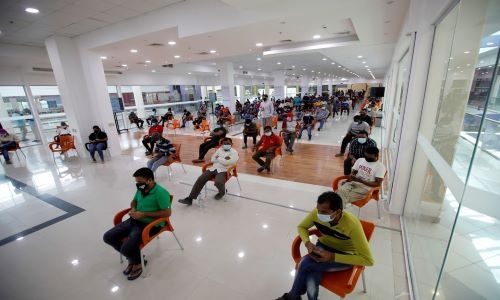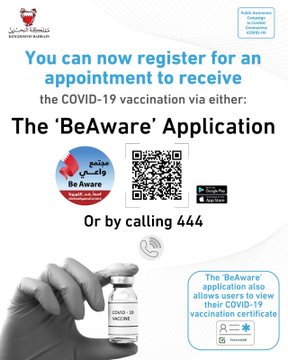Why some people are reluctant to get the vaccine and why that is a problem?
TDT | Manama
The Daily Tribune – www.newsofbahrain.com
Slowly but surely, Bahrain is bouncing back from the deep impacts of the coronavirus (COVID-19) pandemic, and science has given the Kingdom another chance.
Bahrain has authorised the emergency use of six vaccines, namely Sinopharm, Pfizer/BioNTech, AstraZeneca’s Covishield, Johnson & Johnson, Sputnik V and Sputnik Light. And although the number of cases is fluctuating from time to time, it has motivated the government to continue enforcing fundamental public health measures and intensifying mass vaccination efforts to prevent the spread of the virus.
Indeed, vaccines are one of the most effective solutions that can be used against COVID-19. Global health challenges Some people are still hesitant about getting one of the COVID-19 vaccines and that could be bad for them and others.
Vaccine hesitancy – notorious words commonly associated with inoculation drives – has been cited by the World Health Organisation (WHO) as one of the top 10 global health challenges.
Vaccine hesitancy is when people are rejecting a vaccine or when they are deciding to delay it, even when it is available.
The reality is that vaccine hesitancy is nothing new.
Vaccines have been met with suspicion and hostility for as long as they have existed. So why are some people hesitant to get vaccines?
There are several reasons why they might not want to get a vaccine. Common reasons for hesitancy include fears over immediate and long-term side effects of vaccination as well as uncertainty about its effectiveness.
Despite efforts to prevent inaccurate information from spreading, myths and misunderstandings still
For example, the rumour that the vaccine could affect fertility.
Also, many people believe people are having life-threatening reactions to the vaccine.
Fear of long-term side effects.
Although adverse side effects usually show up within a day or two, people are still afraid there might be long-term side effects to vaccines.
The apprehension it seems has been attributed also to a lack of vaccine efficacy data, and questions on safety.
Herd immunity, mutations So why is vaccine hesitancy a problem?
Health experts say a country needs at least 70 to 90% of the population to be immunised to achieve herd immunity – a theoretical concept that refers to what proportion of the population needs to be vaccinated to eliminate local transmission of disease.
Obviously, failure to overcome vaccine hesitancy can prevent reaching herd immunity.
Vaccine hesitancy can also lead to the development of potent coronavirus mutations.
The longer people stay unvaccinated, the more chances a virus has to mutate. New mutations often spread faster and kill faster.
Acceptance among all There is a need for the active involvement of people from all strata of the society – community leaders, associations, private sector, celebrities, religious groups, experts, and political leaders.
Mass media, which include radio, television, billboards, print material, and the internet, must be optimised to achieve the desired outcomes.
Harnessing the power of social media platforms like Facebook, Twitter, and Instagram, by sharing pictures of people rolling up their sleeves to receive vaccines will definitely help promote the national vaccination campaign.
It will not only keep misinformation at bay but find acceptance among all.
Let people take the lead here. Citizens and residents must heed the call of the government to submit themselves to the vaccination process to ensure the safety of all.
Sharing one’s own vaccination experience can be a powerful way to improve vaccine confidence among the population.
With more evidence about the effectiveness of vaccines in fighting COVID-19 come pouring in, the vaccine hesitancy is bound to evaporate soon.
Related Posts


